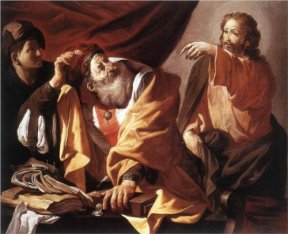
 ATTHEW, WHOSE HEBREW NAME was Levi, was, of course, a tax collector. I think we all know that tax collectors were on the outs with other Jews. There was actually a religious ban on associating with them, because they made their living essentially through extortion.
ATTHEW, WHOSE HEBREW NAME was Levi, was, of course, a tax collector. I think we all know that tax collectors were on the outs with other Jews. There was actually a religious ban on associating with them, because they made their living essentially through extortion.
So why would God choose Matthew? Why would He choose to associate with Matthew, which not even other Jews would do? It’s mysterious, and the only possible explanation is God’s mercy.
But, really, we are not so different from Matthew. We have nothing to offer of ourselves; whatever good we do is really God at work within us. So why would God choose us? Why would He choose to associate with us, who are weak, “unprofitable servants”? Psalm 8 says it so well: “What is man that You should keep him in mind, mortal man that You care for him?” He does, but the reason remains mysterious. It must be mercy. As the Lord says in Matthew’s Gospel: “I did not come to call the righteous but sinners” (Matthew 9:13).
This all has profound ramifications for us. If God could look past Matthew’s sin to associate with him and to call him even to be one of the four Evangelists, we must follow the Lord’s example. The Lord challenges us to go to the people who live on the fringe and to be evangelists, bringing the Word of God to them. These aren’t just some theoretical group of people out in space. They’re real people in your family and my family, among our neighbors and friends.
It’s not good enough just to associate with our “religious” friends. What about your neighbor who never comes to church? It’s easy to judge them, but it’s much harder to invite them to come along. What about the child or grandchild who is cohabiting? We need not simply to disapprove, but to engage them in conversation. What about the poor? It’s great to put money in the poor box, but it is something entirely different to deliver a meal to a person who is homebound or homeless. Jesus challenges us to push those borders, to go beyond what is comfortable, to associate with both righteous and sinners.
If God could take Levi the tax collector and make of him Saint Matthew, think what He could do with all the people who live on the fringes of society today!
